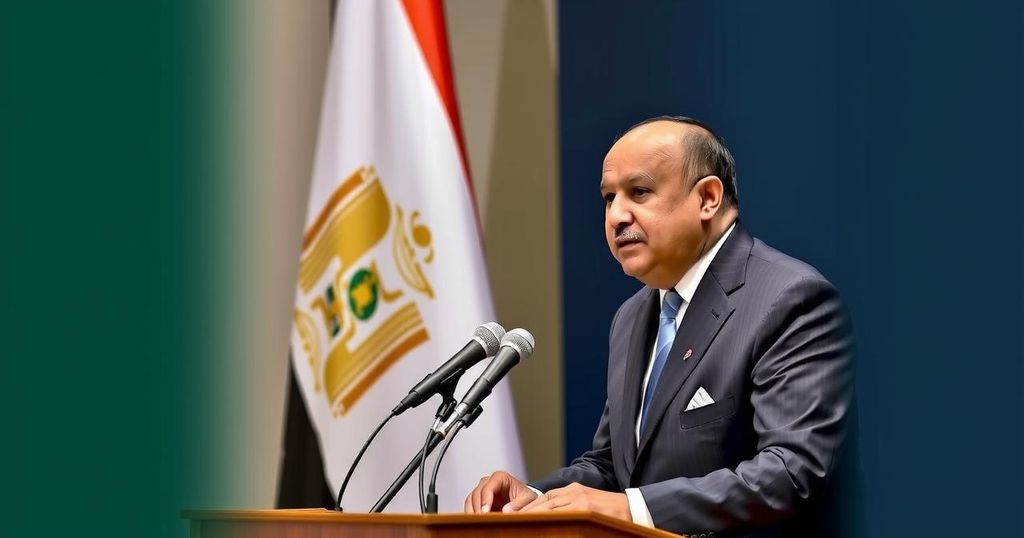Egypt Affirms Commitment to Sahel Security and Support for Niger
Egypt’s Foreign Minister Badr Abdelatty affirmed Egypt’s commitment to the security of the Sahel and Sahara regions, emphasizing cooperation with various Sahelian countries in the face of terrorism. He also discussed the Palestinian conflict, advocating for an immediate ceasefire. Niger’s Foreign Minister highlighted the need for collaboration and support in counterterrorism as both nations prepare for an economic cooperation meeting following the Prime Minister of Niger’s upcoming visit.
On Wednesday, Egyptian Foreign Minister Badr Abdelatty reaffirmed Egypt’s dedication to the security of the Sahel and Sahara regions, emphasizing their critical role in Egypt’s own security strategy. During a joint press conference in Cairo with Niger’s Foreign Minister, Bakary Yaou Sangare, Abdelatty outlined Egypt’s commitment to enhancing cooperation with Sahelian nations such as Niger, Mali, Burkina Faso, Gabon, and Chad. He linked the security crises affecting the Sahel directly to Egypt’s national security interests. Abdelatty acknowledged the precarious security situation within the Sahel and Sahara, particularly the activity of various terrorist factions. He articulated Egypt’s support for the strengthening of national institutions within these countries and elaborated on Egypt’s initiative to provide training assistance aimed at enhancing counterterrorism measures in Niger, Gabon, and Burkina Faso. In addition to focusing on Sahel security, the minister addressed broader regional challenges, notably the Palestinian situation. He advocated for an immediate ceasefire amid the ongoing conflict in Gaza, the West Bank, and Lebanon, asserting that true security and stability in the region hinge upon halting the use of force and recognizing the legitimate rights of the Palestinian populace. Echoing these sentiments, Niger’s Foreign Minister underscored the imperative of collaborative efforts to combat the global phenomenon of terrorism, recognizing Egypt’s extensive counterterrorism experience as a valuable resource for Sahel nations. He called for comprehensive logistical, financial, and military assistance to effectively tackle this urgent issue. Minister Abdelatty further expressed Egypt’s willingness to extend substantial support to Niger, encompassing medical aid and aid in reviving vast agricultural lands. He also announced the planned visit of Niger’s Prime Minister to Egypt, intended to foster economic collaboration between the two countries.
The Sahel and Sahara regions, encompassing several African nations, face significant security challenges, including the pervasive threat of terrorism. In response, Egypt positions itself as a key partner in regional stabilization efforts, emphasizing the interdependence of security across borders. Egypt’s engagement in these efforts reflects a broader strategy to secure its national interests while contributing to regional peace and stability. The ongoing Palestinian conflict is also a pivotal concern, impacting the geopolitical landscape of the Middle East and resonating within African diplomatic relations.
In conclusion, Egypt’s Foreign Minister Badr Abdelatty articulated a comprehensive approach to enhancing Sahel security, reinforcing Egypt’s commitment to combating terrorism and supporting national institutions in the face of instability. The discussions emphasized the interconnectedness of security in the Sahel with Egypt’s own safety. Furthermore, the call for cooperation on the Palestinian issue illustrates Egypt’s holistic view of regional security dynamics. With upcoming discussions between the leaders of Egypt and Niger anticipated to strengthen economic ties, the foundations for a collaborative response to shared challenges are being firmly established.
Original Source: www.dailynewsegypt.com




Post Comment